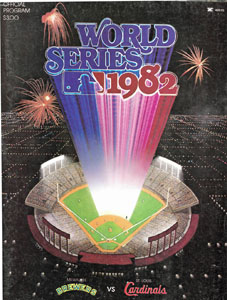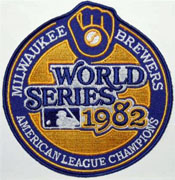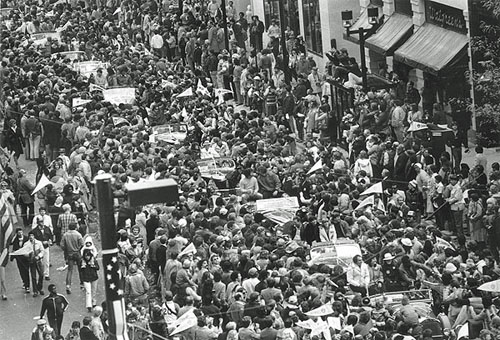1982 - Game 7: Milwaukee Brewers @ St. Louis Cardinals
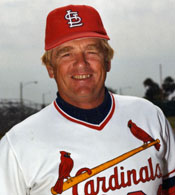
Whitey Herzog
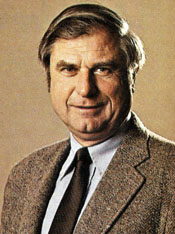
Harry Dalton
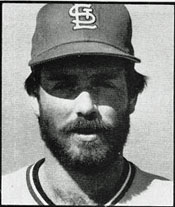
Steve Mura
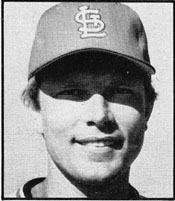
Bob Forsch
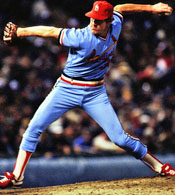
Jim Kaat
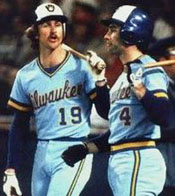
Robin Yount and Paul Molitor
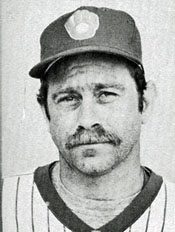
Mike Caldwell
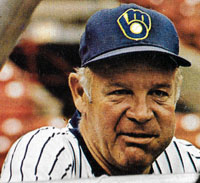
Harvey Kuenn
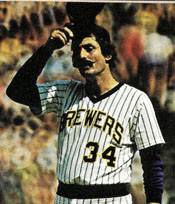
Rollie Fingers
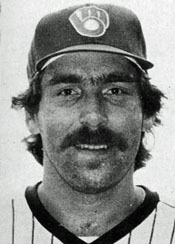
Pete Ladd
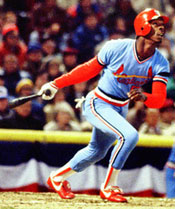
Willie McGee hits one of his two homers in Game 3.
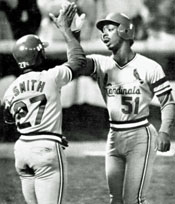
Lonnie Smith greets McGee in Game 3.
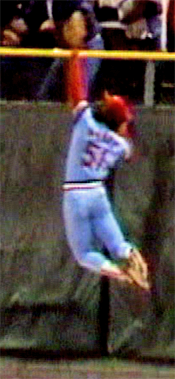
McGee makes HR-saving catch in Game 4.
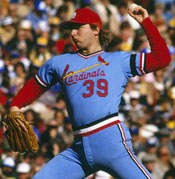
Dave LaPoint in Game 4
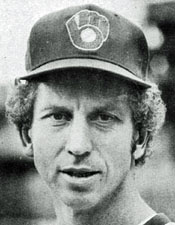
Don Sutton
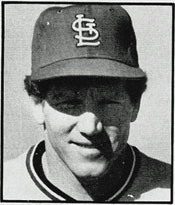
John Stupor
|
Fed up with the performance of his team over the last decade, Cardinals owner Gussie Busch made a crucial decision in the spring of 1980 that would produce three pennants for the franchise over the next eight years.
- Whitey Herzog, recently fired as manager of Kansas City after leading the Royals to three straight American League Western Division championships but never making the World Series, turned down Busch's offer to join St. Louis as a "consultant."
- Three weeks later, Whitey turned down a one-year contract to be the Redbirds' manager. Finally, 52 games into the season, with the club floundering at 18-33, Busch upped the offer to a three-year contract and finally landed his man.
- In mid-August, Busch fired GM John Claiborne and made Whitey the GM. After turning the team over to Red Schoendienst the rest of that season so he could evaluate the players, Whitey returned to the dugout for '81.
Herzog gave a brutal report on the 1980 Redbirds when Busch called him to his office a couple of weeks after Whitey became GM. You've got a bunch of prima donnas, overpaid SOBs who ain't ever going to win a damned thing. You've got a bunch of mean people, some sorry human beings. It's the first time I've ever been scared to walk through my own clubhouse. We've got drug problems, we've got ego problems, and we ain't ever going anywhere.
Herzog started cleaning house in order to rebuild the ball club to its 1960s stature.
- Whitey decided that a team that played in a large ballpark with an Astroturf field needed guys who could run, who could play defense, and we needed pitchers who could utilize those strengths - don't walk people, and get the batter to hit the ball on the ground.
- The first move was to sign free agent Darrell Porter who had been Whitey's C at KC. That necessitated moving fan favorite Ted Simmons to 1B, which bumped Keith Hernandez to LF. When Ted decided he wasn't comfortable at 1B, Whitey traded him to Milwaukee in December 1980 along with pitchers Rollie Fingers and Pete Vuckovich. The Cardinals received outfielders Sixto Lezcano and David Green, and P Lary Sorensen and Dave LaPoint. Herzog then returned Hernandez, one of the best fielding first basemen ever, in Whitey's estimation, to his natural position. It turned out to be one of those rare deals that helps both teams.
We wanted Rollie Fingers or Bruce Sutter, recalled GM Harry Dalton right before his Brewers played the Cards in the '82 World Series. And we thought we had the inside track on getting Fingers from the San Diego Padres, but the next thing we knew, the Cardinals got Fingers, so we started thinking about concentrating on getting Sutter from the Chicago Cubs. But then the Cardinals got Sutter, too. As soon as Whitey got Sutter, we figured he wouldn't want to keep Fingers too. That's when we started talking about Fingers ... What held up the deal at first was my reluctance to include David Green in it. Our scouts considered him to be an outstanding prospect as an outfielder. But when I finally agreed to let Green go, we had to get Simmons' permission. We must've talked with his agent ... for 12 hours before that was worked out. Simmons reportedly received an extra $750,000 over the four years remaining on his contract. We didn't want the deal to blow up, explained Dalton. We'd heard that the Yankees also were highly interested in Vuckovich and Simmons, so we decided to wrap it up, and we did.
- The Cardinals played .578 ball during the strike-shortened '81 campaign. Despite having the best combined record in the NL East, they won neither half of the season and didn't make the playoffs.
A key date in the rebuilding project was December 10, 1981 when Herzog traded talented but troubled SS Garry Templeton and Lezcano to the San Diego Padres for SS Ozzie Smith and P Steve Mura.
- Smith became the final piece of an infield that was arguably the best in baseball.
- Two fine fielders, Tommy Herr at 2B and Keith Oberkfell at 3B, joined Hernandez as St. Louis farm system products.
- The Cardinals committed only 124 errors, three more than the league leading Phillies. And they tied the Phils for tops in fielding % at .981.
The mound staff compiled a 3.37 ERA, third in the league behind Los Angeles and Montreal.
- Joaquin Andujar, acquired in the middle of the '81 season from Houston, led the starters with a 15-10 record.
Pitching coach Hub Kittle helped the temperamental Andujar to his best season since a 12-12 mark with the Astros in 1979 and the best ERA by far of his career at 2.47.
- Bob Forsch, a Redbird since 1974, equaled Andujar's 15 wins. The only other starter with double-digit wins was Mura with 12.
- But the star of the staff was closer Bruce Sutter, acquired in another brilliant trade in that rich month of December 1980, this one with the Cubs. Bruce led the NL in saves for the fourth year in a row with 36.
Whitey: The beauty of that pitching staff was that I really had to worry only about seven innings, because we had Sutter in the bullpen. I knew he could go the last two innings. My goal every game was to get a 3-2 lead after the seventh inning, and I knew we were going to win nine out of ten times.
- A pioneer in creating the modern bullpen, Herzog used righty Doug Bair and veteran southpaw Jim Kaat as setup men to hold a lead for a faltering starter and get the game to Sutter on the back end.
The '82 Cardinals employed so many ways to manufacture runs to the point that the media came up with a new term for their approach - "Whiteyball."
- The Redbirds topped the Senior Circuit with a .334 On-Base %. The club also led in triples with 52 and stolen bases with 200, a whopping 35 more than 2nd place San Diego.
- Those figures compensated for the fact that the Cards finished dead last in HRs with 67 (three less than Mark McGwire would hit by himself in 1998).
The Cards led the NL East most of the season, finally fending off the Phillies by three games.
- They met Joe Torre's surprising Atlanta Braves in the NLCS.
- Forsch threw a 3-hit shutout in the opener in St. Louis, 3-0.
- The Birds came back from a 3-1 deficit and scored the winning run in the bottom of the 9th on Oberkfell's single.
- The Cards completed the sweep in Atlanta 6-2 behind Andujar and Sutter's closing 2 1/3 scoreless innings.
- In his 33rd year in baseball, Whitey Herzog was finally going to the World Series.
The American League champs presented quite a contrast - "Harvey's Wallbangers" as the media called Harvey Kuenn's slugging Milwaukee Brewers.
- The Wallbangers led all of MLB with 216 HRs, 30 better than the Angels. They also topped the Junior Circuit in runs (891), doubles (277), and slugging % (.455). The Brewers scored 10 or more runs on 22 occasions.
- The pitching was good enough: 3.98 ERA (6th) with 47 saves, most in the AL.
The core of the team was a group of players the Brewers drafted and developed in their farm system.
- Young stars Paul Molitor (26) and Robin Yount (27) formed a potent 1-2 punch at the top of the order. Both slapped more than 200 hits (201 for Paul, 210 for Robin). The best all-around SS in the majors, Yount clouted 29 HR and drove in 114. The two crossed the plate 305 times between them.
- Another minor league product was Gorman Thomas. An average CF defensively, he hit the ball hard, leading the AL in HRs with 39 and driving in 112 while batting only .245 and striking out 143 times.
- After arriving from the Red Sox in '77, 1B Cecil Cooper provided a dependable stick, hitting .300 or better every season. His '82 ledger showed .313 with 121 knocked in.
The Brewers almost became the first team since the 1930 Cardinals to have all four infielders hit .300 as Jim Gantner finished at .295.
- LF Ben Oglivie had led the AL in round trippers in 1980 with 41 and clouted 34 more in '82 with 102 RBIs.
- The backstop, former Card Ted Simmons, drove in 97 with 23 HR despite hitting only .269.
When Herzog traded Simmons to the Brewers, Whitey promised Dalton that Ted would help him win a pennant. So you could say that Herzog had a hand in both 1982 pennant winners.
Still, even when you lead the majors in runs, you need pitching to claim a pennant.
- The top winner was another ex-Cardinal, Pete Vuckovich, 18-6 with 3.34 ERA, a performance that would earn him the 1982 AL Cy Young Award. Portsider Mike Caldwell followed with 17 wins against 13 losses and a 3.91 ERA.
- Though past his prime years of 1977-78 when he saved 72 games for the Padres, Rollie Fingers still registered 29 saves.
- Kuenn got good production out of starter-reliever Bob McClure, a southpaw (172 2/3 inning, 12-7, 4.22) starter Moose Haas (193 1/2, 11-8, 4.47), and reliever Jim Slaton (117 2/3, 10-6, 3.29).
Gorman Thomas, one of the team's biggest pranksters, lauded the Brewers' togetherness. We had a camaraderie that I don't think you'll ever see again. There will never be another team that has what we had.
On June 1, you could have gotten very high odds against the Brewers winning the pennant.
- Expected to contend for the pennant after winning the second half (post-strike) AL East title in 1981 before losing to the Yankees in the East playoff, Milwaukee struggled out of the gate. They were tied for 5th place in the AL East with the Orioles 7 games behind the Tigers.
- On that day, the club fired Manager Buck Rodgers and replaced him on an interim basis with Harvey Kuenn, who had been the team's hitting coach since 1971 and was well-liked by the players.
Immediately after his hiring, Harvey held a team meeting and told the players just to go out and have fun. That loosened them up, and they finally began to play to their potential.
- The Brewers went 20-7 in June as Kuenn set the batting order and rarely changed it. He also trusted his pitchers more than Rodgers did.
- The club finished the season with a 72-43 record after the change. But the East race went down to the final weekend when the Brewers went into Baltimore with a three game lead with four to play. The Orioles won the first three to set up a winner-take-all game Sunday. The betting odds favored the home team with ace Jim Palmer on the mound against Don Sutton, who had come to the Brew Crew in a trade from the Astros a month earlier. The game proved to be no contest: 10-2 Milwaukee.
- The Brewers lost the first two games of the ALCS to the California Angels on the road. Their backs to the wall, Milwaukee won three straight at home to cop the franchise's first pennant.
Art Spander of the San Francisco Examiner wrote this about the Brewers' first appearance in the Fall Classic: What Milwaukee has is a town and a team that were made for each other, blue collar and red-blooded, with sloppy mustaches and shaggy hairdos. But they're not concerned as much about appearances as they are by results.
The early betting line favored the Cardinals 7-5 in the first Fall Classic featuring two Midwest teams since 1968 when Detroit edged St. Louis in seven games.
- Dave Anderson in his syndicated column for the New York Times called it "The Six-Pack Series" between teams from America's "foamiest cities."
It looms as a World Series with the malt, barley, hops and yeast of baseball - the power and pomp of the Brewers against the stealth and swiftness of the Cardinals. Other writers labeled it the "Suds Series."
- The presence of former Cardinals on Milwaukee and former Brewers on St. Louis added interest to the a series that did not have an East or West Coast team to attract attention.
Ted Simmons received permission to stay in his suburban St. Louis home for the games in the Mound City. I still live in St. Louis. I have my home there, I have all my friends there, and now I'm playing a World Series there. When you sleep in your own bed, stay at your own house, get up and take the kids to school and then go to the ball yard, what more could you want in the World Series?
- The Brewers would be at a disadvantage because closer Rollie Fingers would not be available because of an ailing arm that kept him out of action after September 2. Kuenn turned to Peter "Big Foot" Ladd, a former prison guard, instead in late inning situations, and the righty had garnered two saves in the ALCS, including a scoreless 9th in Game 5. Nevertheless, Harvey put Rollie on the active roster in hopes he could give him an inning or two. (Fingers would not face a batter.)
- A topic of discussion was how Milwaukee would fare defensively on the artificial turf in St. Louis. The Brewers' 1-5 record on a similar field in Kansas City did not bode well.
- The Cardinals held a slight edge in experience with five players who competed in the Fall Classic: George Hendrick, Jim Kaat, Darrell Porter, Lonnie Smith, and Gene Tenace. Only Cecil Cooper, Rollie Fingers, and Don Sutton among the Brewers had appeared in a previous World Series.
- Since it was an even-numbered year, the designated hitter rule would be in effect for every game of the Series. That normally would give the Brewers a slight advantage, but the Cardinals' pitchers were among the worst hitting staffs in the NL. From his time in the AL, Herzog knew how to deploy the DH and would be able to go righty with Gene Tenace or David Green or lefty with Steve Braun or Dane Iorg.
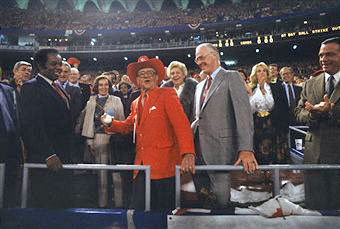
Cardinals owner August Busch throws out first ball of World
Series with Commissioner Bowie Kuhn at his side. |
|
Series Results
- Tuesday, October 12 @ St. Louis: Brewers 10 Cardinals 0
WP: Mike Caldwell; LP: Bob Forsch
- Wednesday, October 13 @ St. Louis: Cardinals 5 Brewers 4
WP: Bruce Sutter; LP: Bob McClure
- Friday, October 15 @ Milwaukee: Cardinals 6 Brewers 2
WP: Joaquin Andujar; LP: Pete Vuckovich
- Saturday, October 16 @ Milwaukee: Brewers 7 Cardinals 5
WP: Jim Slaton; LP: Doug Bair
- Sunday, October 17 @ Milwaukee: Brewers 6 Cardinals 4
WP: Caldwell; LP: Forsch
- Tuesday, October 19 @ St. Louis: Cardinals 13 Brewers 1
WP: John Stuper; LP: Don Sutton
|
|
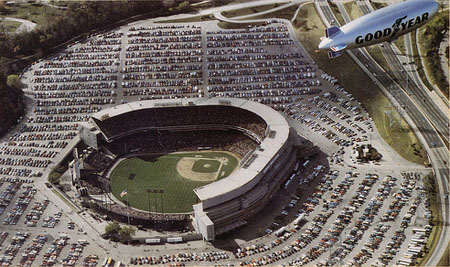
Milwaukee County Stadium during the 1982 World Series |
Each team enjoyed a blowout win, Milwaukee 10-0 in Game 1 and the Cards 13-1 in Game 6.
- Game 3 belonged to Willie McGee, who turned in one of the most sensational performances in Fall Classic history. He became the third rookie to clout two HRs in a World Series game, accounting for four of the Redbirds' six runs. If that weren't enough, Willie made two outstanding catches, one of which took a HR away from Gorman Thomas in the 9th to help seal the victory.
- In Game 4 the next day, the Cards led 5-1 in the bottom of the 7th and seemed to be coasting to a 3-to-1 games lead. But P Dave LaPoint dropped Hernandez's toss that should have been the second out of the inning. That opened the door to six unearned runs that enabled the Brewers to even the Series.
- When the Wallbangers won the next day as well in a game in which Yount became the first player ever to record two four-hit games in a World Series, the Cardinals faced elimination as they returned home for Game 6. With veteran Don Sutton facing rookie John Stupor, the Brewers looked like a good bet to take home the trophy. But Stupor pitched steady ball through several rain delays while the Cards jumped all over Sutton to set up the ultimate game.
- The Cardinals wore black armbands during the Series in honor of former star 3B and manager Ken Boyer, who died September 7.
The Cardinals sported a 6-1 mark in the previous Game 7s in franchise history.
- Herzog announced right after Game 6 that we would go with his ace, Andujar, for the deciding game.
Whitey revealed that he had promised Joaquin a Cadillac if he shut out the Brewers in Game 3. Andujar lost his chance when he got hurt in the seventh inning. Asked if the offer applied to Game 7, Herzog laughed and said, I'll have to call Gussie Busch because I'm not buying the guy a car. If anybody buys it, it will be Gussie B.
- The rain that plagued Game 6 had vanished, and the forecast called for a fair evening with temperature in the 40s.
The city of Milwaukee announced that, win or lose in the seventh game, the Brewers would ride on Wisconsin Avenue beginning at noon the next day, then go to County Stadium for an "appreciation day" rally. However, schools would not be closed even if the Brewers won. When the vice president for academic affairs of Marquette University was asked if classes would be canceled, Edward Simmons replied, I have confidence in students' ability to study and find time to party. They have shown an amazing ability to do that.
|
Milwaukee Lineup
| Paul Molitor |
3B |
| Robin Yount |
SS |
| Cecil Cooper |
1B |
| Ted Simmons |
C |
| Ben Oglivie |
LF |
| Gorman Thomas |
CF |
| Roy Howell |
DH |
| Charlie Moore |
RF |
| Jim Gantner |
2B |
|
 |
 |
St. Louis Lineup
| Lonnie Smith |
LF |
| Ken Oberkfell |
3B |
| Keith Hernandez |
1B |
| George Hendrick |
RF |
| Darrell Porter |
C |
| Dane Iorg |
DH |
| Willie McGee |
CF |
| Tom Herr |
2B |
| Ozzie Smith |
SS |
|
|
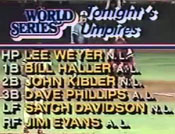
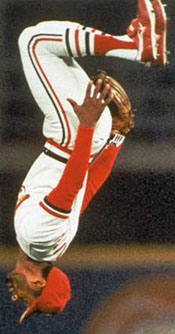
Ozzie Smith does back flip.
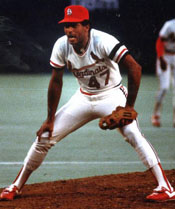
Joaquin Andujar
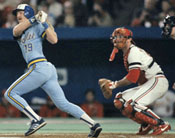
Yount bats.
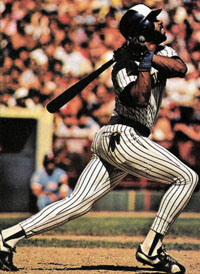
Cecil Cooper
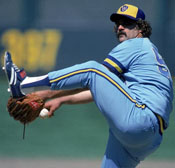
Pete Vuckovich
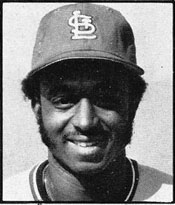
Lonnie Smith
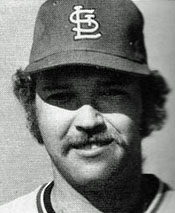
Ken Oberkfell
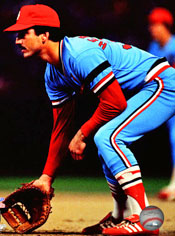
Keith Hernandez
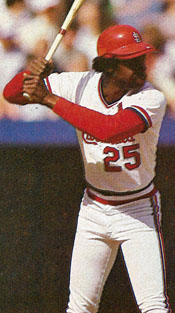
George Hendrick
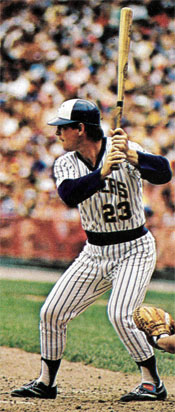
Ted Simmons
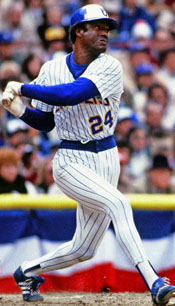
Ben Oglivie
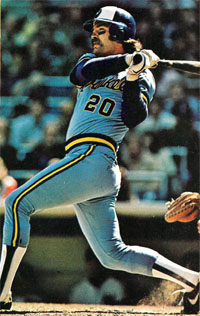
Gorman Thomas
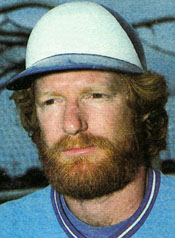
Roy Howell
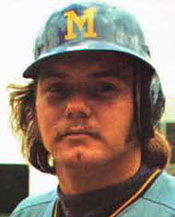
Charlie Moore
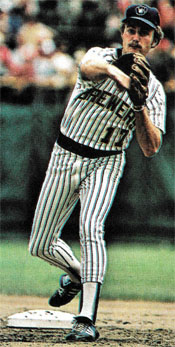
Jim Gantner
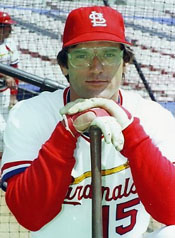
Darrell Porter
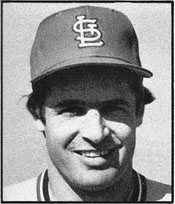
Dane Iorg
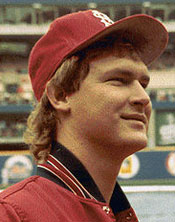
Tommy Herr
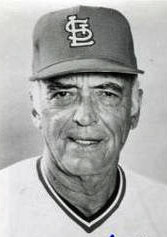
Hub Kittle
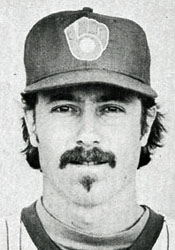
Bob McClure
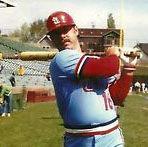
Gene Tenace
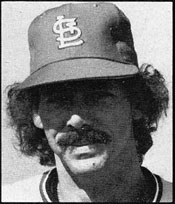
Mike Ramsey
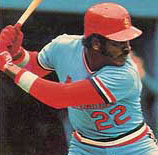
David Green
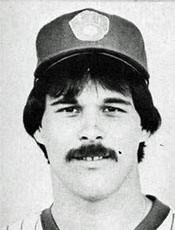
Moose Haas
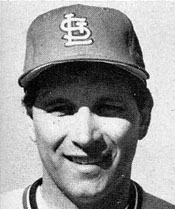
Steve Braun
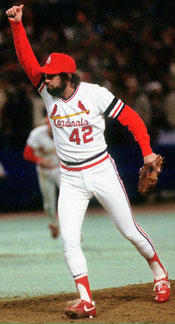
Bruce Sutter exults after final pitch.
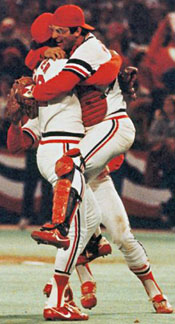
Porter embraces Sutter after final out.
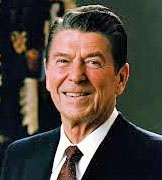
President Ronald Reagan
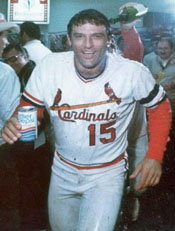
Darrell Porter doused.
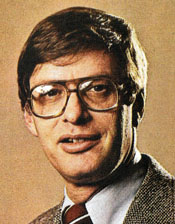
Bug Selig
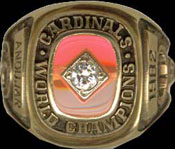
|
Game 7: Wednesday, October 20 @ Busch Stadium II
- NBC telecast the Series with Joe Garagiola, Tony Kubek, and Dick Enberg behind the mikes and Tom Seaver providing commentary.
- Ozzie Smith did two backflips, one forward, one backward, as he ran to his position. The All-Star SS wore long red underwear on the 44° evening.
1st inning
- So far in post-season appearances, Andujar had given up just 2 runs in 13 innings.
3B Paul Molitor (9-for-27, .333) liked to swing at the first pitch and did so again. The bat broke, leaving about 6" in his hands, as RF George Hendrick loped over to take the short fly.
The only SS ever to lead his league in both total bases and slugging %, Robin Yount hit a high chop to 3B Ken Oberkfell next to the bag.
1B Cecil Cooper (7-for-25, .280), appreciated more by the baseball fraternity than the public at large, poked a grounder to Oberkfell, who threw into the dirt at 1st but Keith Hernandez dug it out to retire the side.
After the game, Andujar said his knee, hit by a hard grounder off Simmons's bat in Game 2, bothered him from the first inning on. But I told our pitching coach, Hub Kittle, "I'll die first. I'll never give up." My sinker and curve didn't work, so I had to rely on my fastball more than I wanted.
- Pitching sleeveless on a chilly night like Andujar, Pete Vuckovich was 0-2 in the post-season with a 4.30 ERA. He had lost his last five decisions of the regular season. He developed shoulder trouble during an 11-inning game against Boston September 20.
Like Molitor in the top of the inning, LF Lonnie Smith, the only Cardinal starter wearing cleats on the artificial surface, smacked the first pitch to RF.
Oberkfell fanned on a down and in slider.
Hernandez hit a high chop off the hard surface right in front of the plate. 2B Jim Gantner jumped up to take it on the second hop but had no chance to throw out the batter.
Hernandez was celebrating his 29th birthday. Since rain-delayed Game 6 didn't end until 12:20 AM, he boasted that he was the only man ever to play two World Series games on his birthday.
After going 0-for-15 in the first four games of the Series, Keith credited his wife with giving him advice that turned his Series around. She said he wasn't being aggressive enough at the plate. I decided if I look bad striking out, I look bad striking out, but I'm going to be aggressive. He had gone 5-for-9 in Games 5 and 6.
Hendrick (7-for-23, .304) fouled to C Ted Simmons just to the left of the plate.
2nd inning
- After homering in the first two games, Simmons (4-for-19, .211) had not seen many good pitches. He flew to Lonnie Smith on Andujar's first pitch, a 91 mph tailing fast ball.
Ben Oglivie (5-for-23, .217) bounced to Oberkfell.
CF Willie McGee easily handled Gorman Thomas's fly.
So far, Andujar showed no signs of the bad knee affecting his pitching - 6 up, 6 down.
- C Darrell Porter took strike three looking.
Surprise hero Dane Iorg (7-for-14, .500) grounded the first pitch up the middle. Gantner dove and grabbed up, jumped up and threw, but way too late. That set a record for most hits by a DH in the World Series.
McGee hit a humpback liner to his opposite number, Thomas, in CF.
Switch-hitting Tommy Herr stepped in to the left-hand batter's box. Wary of Iorg taking off on a hit-and-run or straight steal, Vuckovich tossed to 1st. When Herr ran the count full, Dane could take off. Tommy took a change up low.
Ozzie Smith bounced a 2-1 pitch over the mound. Yount grabbed it in front of 2nd but held the ball to check Iorg rounding 3rd.
Lonnie Smith had a double and triple off Vuckovich in Game 3 in Milwaukee. But he couldn't get around on a high riding fastball and flied to Charlie Moore in RF.
As Vuckovich walked to the dugout, he yelled some words to home plate umpire Lee Weyer.
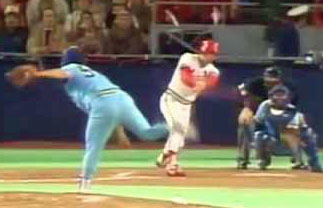
Pete Vuckovich pitches to Darrell Porter. 3rd inning
- DH Roy Howell made Joaquin throw six pitches before bouncing to Hernandez, who ran in and fielded the ball on a big hop almost halfway to 2nd and threw a little behind Andujar, who hustled to 1st and grabbed the ball to avoid an error like the fateful one Hernandez made tossing to Dave LaPoint in Game 4.
LF Charlie Moore, who had played excellently at the plate (8-for-23, .348) and in the field, .
Gantner had tied a Series record set by Honus
Wagner in 1903 - errors in four consecutive games. Jim smacked the artificial turf equivalent of a grass cutter straight to Ozzie.
- Oberkfell bounced the first pitch to Cooper.
Hernandez drew the first free pass of the evening.
Hendrick got the first Cardinal hit through the infield - a grounder between 3B and SS. Keith stopped at 2nd.
Porter walloped the first pitch deep to RF. The crowd rose, but Moore caught the ball on the warning track.
Both runners advanced after the catch.
That brought up the Redbirds' hottest hitter - Iorg, the first DH in Series history to get three extra base hits in a game. But Dane grounded out 4-3. The Cards had now stranded six in three innings.
I like to play in the field, too. Iorg insisted but added that DHing, is a great opportunity for me. I'd like to see the DH used all the time. It's been a pretty good rule for me this World Series. I was apprehensive about it ... but I've gone through it a lot of time, and I've always been able to be pretty successful at keeping my stroke.
4th inning
5th inning
- Oglivie picked on the first pitch and launched a cannon shot that zoomed into the seats high above the fence in RF. It was his first post-season HR.
Oglivie's home run was on a bad slider, said Joaquin.
Early in the game, Andujar told his teammates in the dugout, You get me one run, we world champs. After Oglivie's homer, Oberkfell visited the mound. What do you think now? The Dominican replied, I think we need two.
Thomas just missed a fast ball. Lonnie went back to the wall, then hurried to his left to grab the wind-blown fly.
Howell smacked to Oberkfell, who caught the hard hop in self defense and made the play.
Moore bounced over the mound to Herr who fired to first to retire the side.
Cardinals 1 Brewers 1
- Hendrick rolled the first pitch to Yount.
Pete went full to Porter before getting Darrell to pop to SS.
On the verge of completing the Cards' first 1-2-3 inning, Iorg hit a high hopper up the middle that hit the bag.
McGee hit an easy fly to Thomas in LCF. Vuckovich had now thrown 70 pitches in five innings.
6th inning
- On Andujar's 50th pitch, Gantner drilled the first pitch on a line to the RCF wall for a double.
Doug Bair began throwing in the St. Louis bullpen.
Molitor bunted to the left of the mound. Andujar grabbed the ball, whirled, and threw to 1st as Herr raced to cover as the runner bore down on him. The ball glanced off Paul's hip and rolled to the bullpen as Gantner scored and Molitor took second on a single and an error.
Yount hit a high chop that Herr caught moving to his left while Hernandez passed in front him, but Andujar failed to cover 1st. 1st and 3rd and no out.
Pitching coach Hub Kittle visited the mound to calm down Andujar as Jim Kaat joined Bair in the pen.
As Yount took off for 2nd, Cooper hit a sacrifice fly to LF.
Simmons hit on one bounce to Hernandez at the bag. Keith threw to Smith who fired back too late.
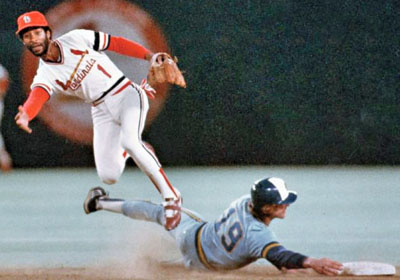
Smith forces Yount at 2nd in 6th.
Brewers 3 Cardinals 1
Andujar denied he was tiring in the 6th. We just made some mistakes. I made a mistake on a couple pitches. But there was no way I wouldn't pitch tonight. I wanted to pitch the last game very badly.
When his team fell behind 3-1, Herzog admitted, I was thinking about all the men we left on base.
- With the crowd chanting, Herr tried to bunt his way on but the ball went foul. Several pitches later, Tommy nubbed one to Molitor.
Ozzie slapped a liner over Molitor's head. Oglivie, guarding the line, held the hit to a single.
Lonnie ripped a grounder just inside the 3B bag for a double. Molitor, playing alongside the bag, dove but couldn't get a glove on it.
Vuckovich held up the game to empty the dirt out of each shoe. Then Kuenn came out and called for the lefthander to face Oberkfell.
Herzog countered by sending Gene Tenace to pinch-hit. Appearing in his fifth game of the Series, McClure walked 1972 World Series MVP on five pitches.
Bob said afterward, The umpire was squeezing me a little bit on Tenace. But they might have been a little bit up. I'll give him the benefit. But the walk to Tenace was no big deal. We have a left-hander facing a left-hander. We're all thinking double play. I felt like I could get the double play.
That brought Hernandez to the plate as Mike Ramsey ran for Tenace.
McClure and Hernandez had grown up together in Pacifica CA. Bob: We grew up two or three blocks from each other. We went to the same grade school and high school. It was a real small town. I knew him as well as anybody in town. I knew him almost as well as my brother. They played on different Little League teams but on the same high school team until Keith moved away before his sophomore year, and the two fell out of touch. They faced each other once in AAA ball. He got a double off the wall, McClure recalled. But they didn't stay in touch. We figured we'd just see each other in the World Series.
Porter considered Hernandez a good teammate. Keith was a very clutch hitter, a very important hitter in our lineup. He was a great defensive player as well. I loved him. He was a fun guy. He always had something funny to say, and he was a good guy to have around.
Keith lined a 3-1 pitch into RCF, scoring two runs to tie the game. Ramsey barely beat Yount's relay throw to 3rd amid the deafening roar of the crowd.
McClure: I felt he was looking away. Teddy felt he was looking away. So I threw a fastball low and in. He just went down and got it. I thought it was a good double play pitch. But it didn't work. He hit it perfect. It wasn't hard enough to reach the outfielders, but it was hard enough to get over the infielders' heads. Keith's just such a great competitor ... He put up a heck of a fight. He was the victor in this one. More power to him.
Hernandez described the pitch he hit: It was an inside corner fastball, good pitch. I don't know how I hit it.
Next up was Hendrick, who led the NL with 14 sac flies and the Cards' leading RBI and HR man the last three years. Kuenn stayed in the dugout and did not bring in a righthander. George hit the 0-1 pitch down the 3B line. Molitor threw home to easily get Ramsey but the ball was ruled foul. Hendrick fouled off two straight 1-2 offerings. With the crowd singing, "Here we go, Cardinals, here we go," he lined an outside pitch between 1st and 2nd to move all the runners up one base and put the Cards ahead.
Kuenn on why he let McClure pitch to Hendrick: They had two left-handers up after Hendrick (Porter and Iorg). I didn't consider lifting him after Hernandez. I thought Bobby could get them out.
While the ushers collected coins that fans threw on the field - the second such interruption of the inning - Tom Seaver wondered when Whitey would bring in Sutter. McClure threw a sharp breaking curve on 3-1 that Porter swung and missed. Then Darrell poled the next curve deep but foul down the RF line. The C hustled when he hit a grounder to 2nd and beat the double play throw to 1st to keep the inning alive.
As soon as David Green was introduced as the pinch hitter for Iorg, Kuenn called for Haas.
A lefthanded batter, Steve Braun, took Green's place at the dish. Braun broke his bat on a 1-2 pitch to go down 4-3.
Cardinals 4 Brewers 3
7th inning
- For the first time all game, Andujar fell behind a hitter, going 2-0 on Thomas. But Joaquin fought back and got Gorman swinging on a 3-2 fork ball. The best pitch was the 2-0 breaking ball that surprised Gorman, who was "looking smoke all the way" according to Tony Kubek.
Michael Bauman wrote in The Milwaukee Journal the next day about what happened during Gorman's at-bat: The cheering started in the stands along the first base side ... and swept through the crowd like a rumor. The cheering grew in voices and volume until it rocked back and forth across Busch Stadium, changing into the steady cadence of a chant; the simple repetition of a man's name. And the thing that struck you was that what generated this wall of sound was not a great play, not a home run, but the simple act of a bearded man wearing a red St. Louis Cardinals warmup jacket, carrying a baseball glove, walking down the right field line to the Cardinals bullpen. ... The noise you heard thousands of voices repeating over and over was "Bruce! Bruce!" It was as though their savior had come, and, if you were a St. Louis baseball fan, in a way he had.
Most games, Lonnie Smith gave fans an unwanted thrill in LF, and now he did that again. Howell hit a fly over Smith's head. Lonnie turned the wrong way, then righted himself and made a lunging catch a few feet short of the wall.
Moore bounced a ball into the hole that not even the Wizard could make a play on.
With the tying run on 1st, Gantner hit the first pitch sharply back to the mound. Andujar snared the ball and threw to 1st to end the inning. Then the Dominican shaked and pointed his finger in Gantner's direction - a gesture which, along with snapping his fingers, he had performed many times before after an out. Gantner responded by calling Andujar a hotdog and, according to Joaquin, added something unprintable that set off his temper. The pitcher charged Gantner but was wrestled back and held by home plate umpire Lee Weyer until other Cardinals and Herzog arrived to help cool down their pitcher.
Afterward, Andujar defended his actions. A lot of people call me hotdog. I don't care. What should I care? But when you mention my mother, I go after you. You mention my mother, that's all. Either I get you or you get me. But I come after you.
Gantner insisted he spoke no profanity. I just told him, "You're a hotdog." I respect him as a pitcher. If he does that to psyche himself up for a game, fine. But he has to realize some guys are going to do that. If I'd known that [it upset Andujar that much], I'd have done it in the second inning. Maybe it would have snapped his concentration.
When told of Gantner's remarked, Andujar got mad all over again. I understand enough English to know what he said. A second time? He say it a second time, he'll be in hospital.
Andujar finished the evening throwing 72 pitches, including 51 strikes.
Herzog: Joaquin hadn't been able to walk or do anything for five days. He gave us four great innings, then he started to get the ball up a little bit. Once we got him through seven innings, we knew we had the best reliever in baseball. We pay him a lot of money, so I figured we ought to use him.
Andujar: I was ready to go nine, but Whitey is a smart manager, and I think he made the right decision.
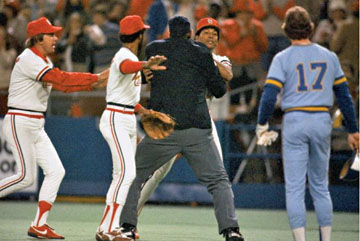
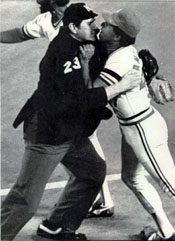 Lee Weyer restrains Andujar from going after Gantner.
- McGee swung at the first pitch and grounded out 4-3.
Herr lined to Yount.
Haas completed the 1-2-3 inning by inducing Ozzie to ground to Gantner.
8th inning
- Amid a deafening roar, Sutter strode in from the bullpen to the dugout. Then he walked to the mound to face the top of the Milwaukee order.
Bruce said after the game: This is what I wanted to do. I wanted to be the one out there pitching today, to get the last out. That's definitely the spot I wanted to be in - the seventh game of the World Series, a one-run lead, and you've got to hold 'em. He had complete confidence in his famous split-finger fastball. When I throw my pitch, and it's workin' good, it doesn't matter who is up there, they're not gonna hit it.
The Brewer hitters followed what their scouting reports suggested. They laid off the first pitch in an effort to make Bruce come back with a pitch in the strike zone. The problem was that he was starting them off with strikes.
I was getting ahead of them, Bruce said later. It looked like they were taking the first strike. Once they do that, I can move my pitch around. I can be pretty much in command.
After Molitor fell behind 0-2, he grounded to SS.
Yount also found himself in an 0-2 hole as the crowd chanted Bruce! Bruce!. Robin fanned on a splitter in the dirt.
Next up was Cooper, who homered off Sutter in Milwaukee. The stadium went bananas when Cecil hit the first pitch to Herr.
- Lonnie rapped the first pitch for his second straight double, this one bouncing over the fence in RCF.
Simmons conferred to Haas in anticipation of a bunt by Ramsey. The valuable utility man, who had played 2nd, SS, and 3rd at times during the season, bunted the first two pitches foul. Would Whitey have him bunt with two strikes? Yes, but this one went foul also.
Kuenn wasted no time signaling Haas to walk Hernandez intentionally.
Up came Hendrick, who drove in the go-ahead run in the 6th. Facing a right-hander this time, George flied to CF.
Kuenn brought in one of his starters, Mike Caldwell, to face Porter. Since Mike had won two games in the Series, Joe Garagiola pointed out that he had a chance to do what Harry Brecheen had done in the 1946 Series if Caldwell could hold the Cards and the Brewers rally to win. But Darrell made that dream more difficult by lining a single to RF to score Smith and send Hernandez to 3rd.
Oooh, was I glad to get that, Porter admitted afterward. I didn't want to face Simmons, Thomas, and Oglivie with just one run in the ninth.
Another lefty, Braun,
reached out and poked a curve into CF to knock in Hernandez.
McGee bounced to Gantner.
Cardinals 6 Brewers 3
9th inning
View the entire game.
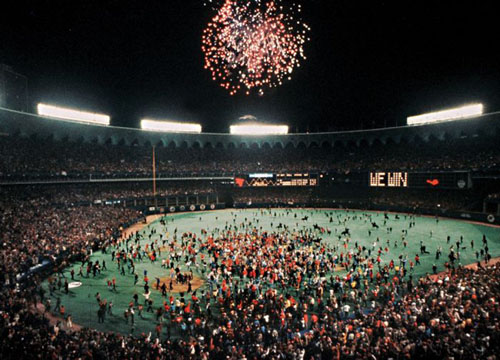
Cardinal fans flood the field despite guard dogs and horses.
Pete Etzel, Assistant Sports Editor of the Milwaukee Journal, wrote the next day:
The use of nasty, growling attack dogs by police to control the on-field celebration at Busch Stadium here Wednesday night after the Cardinals won the World Series was ridiculous.
Those dogs were no puppies. They bit fans and, in some cases, even police. To make matters worse, the dogs were whipped into a frenzy by the crowd, and who knows what harm they could have inflicted on the people?
The dogs and 13 horse-mounted patrolmen didn't accomplish their goals of keeping the fans off the field. ... Why did they even attempt it? The crowd here didn't seem dangerous. This wasn't New York. There was no need to endanger the well-being of happy fans.
Postgame
Darrell Porter won the World Series MVP Award to go with the same honor from the NLCS.
Porter: I was surprised and very eleated and happy. I didn't have a very good year at all, and all of a sudden in the postseason I just got hot. Really, in the World Series there were several players who could have been the MVP. My personal opinion is, the Lord was just being faihful to me, and I think he just gave it to me. ... Considering how low I had fallen the year before, this was definitely the highlight of my career.
Future Hall of Famers in the 1982 World Series
Cardinals: Manager Whitey Herzog, Ozzie Smith, Bruce Sutter
Brewers: Rollie Fingers, Paul Molitor, Don Sutton, Robin Yount
Cardinals' Clubhouse
- Commissioner Bowie Kuhn visited to convey his congratulations and award the trophy.
- Reserve C Glenn Brummer led the league in spraying champagne at anything that moved. 83-year-old owner August Busch sat with a bottle of his own beer. The Cards skipper warned his players not to get any champagne on their boss.
- Herzog made a strange admission. I really didn't feel very excited. Maybe I will be when it sinks in tomorrow. I thought after we won the second game, that if we got back to St. Louis, we would have a good chance of winning. I didn't really get that excited about it. I don't know why. I thought we would go out and play well. But I'm real happy we won. On the MVP, Porter: Darrell had three great years for me in Kansas City, and I'm happy he got one here. He does a lot of little things in the field that go unnoticed, and I'm just happy for him.
Herzog received a phone call from President Ronald Reagan. I want to call and congratulate you on being world champion, said the Chief Executive.
Thanks, replied Whitey. I know you're a great baseball fan.
Reagan: It's been lots of years since I used to do those games, mostly Cubs, but I saw a lot of good Cardinal games. Great Series, you've got a lot to be proud of.
The President called Harvey Kuenn two minutes later. I know that the Series went the other way, but I want to congratulate you and all of your players. The World Series always means a lot to the American people. It was a great Series. It went right down to the wire. It could have gone the other way. Kuenn said, Thank you for calling. I'll convey your message to all our players.
- While others were celebrating with champagne, Sutter pulled on a Budweiser because, he explained, I'm a beer drinker. He exulted in recording the last out. Here we are, the two best baseball teams in the world, tied three games each. The starters are Joaquin and Vuckovich. And then I come in and strike out the last guy. ... I don't think it'll really hit until some time this winter. I'll be sitting out there in the deer stand, and I'll probably start yelling. I won't get any deer, but it'll be fun. Bruce praised his opposite number, Fingers, who hadn't thrown a pitch in the Series. He's been the greatest of all. I wish he'd retire pretty soon, so I could catch him in saves. A Milwaukee reporter wanted to know how Sutter felt to come back after getting "rocked" in Game 5 when he gave up the last two runs in the 6-4 Brewer victory. The pitcher was not amused by the question. We just won the World Series, and you guys want to talk about runs I gave up in Milwaukee? What the hell does that have to do with anything? It really (bleeps) me off. I didn't think I was getting "rocked." The Brewers are a great hitting ballclub. I go out there 70 times a year with the game on the line. I'm not going to win every one. I'm not going to strike everyone out. If I did that, it wouldn't be any fun. These aren't high school kids out there. This is one of the greatest hitting clubs in baseball.
- Porter popped a cork and lifted the bottle high, a wide grin on his face. But the recovering alcoholic told reporters, Remember. This is non-alcoholic stuff now. He turned the bottle around so that everyone could see the label: Catawba Pink Grape Juice. This is wonderful. It's great. I can't believe it. But I ain't breaking my sobriety for it either. ... It's something you dream about, the honest truth. From the time you're a Little Leaguer, you dream of being a world champion. Now I can say that. I've got a wonderful wife, a little girl 6 1/2 months old ... I haven't had a drink in two years. I'm a happy man. ... You know, I messed up my life in 1980, but I turned that around when I went to rehabilitation. My life started over from there. That's when I lucked out. ... I still can't believe I won those two [MVP] awards. ... I mean, I'll accept this, but I don't know how I got it.
Years later, Porter reflected on the '82 Cardinals. We just had guys who did their jobs. As an example, Tommy Herr ... wasn't flamboyant at all, but he just got the job done, and he knew the game. And all those guys were really concerned about winning. That was the deal. Play the game and do what you have to do to win the game - whatever that is. And I don't think that happened very much then with teams ... When you look at our team, nobody put fear in anybody at all. They would come into our place, and we would sweep them, and they would go away, thinking, "How did that happen?"
- Ozzie Smith praised the opponent. I think we should all tip our hats to the Brewers. It's hard to say that there is a loser in this Series. They're really such a great team.
- Willie McGee: I'm ready to go to spring training right now. There is so much pride in winning this. I'll take what money is coming to me, but if I had to, I'd play for fun. There can't be anything better than this. There isn't, is there? I love baseball. I love to play. I don't want to ever stop.
- McClure spent a considerable amount of time after the game with his old pal Hernandez, the birthday boy - You couldn't have a better birthday present than this! Bob said, I told him congratulations. God bless you. See you next year. Keith spoke about what he learned from the season: If I found out one thing, it's teams on paper don't mean bleep. It's team attitude, togetherness, no selfishness, sacrifice for 25, no one person wanting the glory. We're a unit here. We've got 25 guys playing together. There are no egos, no one or two or three people who want all the headlines.
Keith said the two teams were evenly matched but that spacious Busch Stadium was a big help to the Cards. I think one difference was our ballpark, the big dimensions. They hit some balls here that were caught that would have been out of the park in Milwaukee.
Because he wasn't named the Series MVP, George Hendrick continued his ban on talking to reporters that he had instituted during the 1976 season. He had told his agent that he might break his vow of silence if he won the MVP award. He did appear briefly in the media interview room but only to get to the Cardinals' clubhouse.
Brewers Clubhouse
- Kuenn expressed a different approach to handling the defeat. When asked how long it would take his team to get over the seventh game loss, he replied: I hope it takes 'em a half hour. It's like I told 'em after the game. "Boys, don't sit with your heads hanging in your lockers. Laugh and joke and have a good time because you can be proud." ... There's nothing like winning the World Series. And yet, how much can you accomplish in one year? We accomplished a great deal. Winning the batting title with Detroit in '59 and playing in the '62 World Series with San Francisco were thrills. But nothing that's happened to me in baseball could compare with this. ... Every player on this team is like a son of mine, and they gave it all they had. There's no question in my mind that they'll be back in the World Series. They're all winners. Asked if he regretted not having Fingers available, Kuenn said, I never once said I wished I had Rollie Fingers. I figure when a man isn't available. I don't even want to think about it. We didn't have a situation in the World Series where I could have used Rollie to save a game. But even if we had, I wouldn't "if" it. The man who had undergone heart and stomach surgery and lost a leg in the last six years told reporters: I've gone through a lot worse things than losing the seventh game of the World Series.
- Some of the players, though, found it impossible to put aside the disappointment. Haas: I could go in a corner and cry if I wanted. Simmons: It's horrible.
- Don Sutton, who had lost four World Series with the Dodgers and failed to win either of the games he started in '82, was more philosophical. Right now, we're the ones who aren't happy. But there are 24 other clubs who would have traded places with us. There are 24 other clubs who would have loved to have lost this game. ... You can lay the responsibility on me. If I had done my job a little better, we might be looking at a different result.
- Vuckovich spent a long time in the trainer's room. When he finally emerged, he told reporters, Catch me later. I've got to see some other guys. Some guys I hate. Then he headed down the hall to the Cardinals clubhouse. When Pete finally talked to reporters, he said, The only time I cry is when there's a death in a family or I lose a close friend. ... Or lose the seventh game of the World Series. I feel like I let down my teammates, the organization, and the people of Milwaukee. I had a chance to win it. Ice it. A 3-1 lead. I couldn't do it. I tried my best. It wasn't meant to be. I would say tomorrow's another day, but it isn't. Tomorrow's another year. ... It wasn't the turf. They hit the ball into the dirt. The balls they hit and chopped everywhere were hit into the dirt by the plate. It was very hard. They packed it up.
- Simmons: Vukie was pitching really good. Unfortunately, he gave up two base hits to put them in the position to tie the ball game. It seems throughout the Series, when they got in the position to tie the ball game, they capitalized on it. ... Regrets? Yeah. You have a lot of regrets when you lose. But no. I always wanted to play in a World Series. The seventh game is something you always dreamed of. I played in the seventh game of a World Series.
- DH Roy Howell went 0-for-11 in the Series. You gotta give credit to the other side. They're no dummies. They knew we had power. They just did a good job of scouting us. ... It was power against speed. Speed came out on top. ... They hit the ball from foul line to foul line. Our job is to keep them off base. If they get on second, they can score on just about anything. They have good speed.
- Thomas, who finished 3-for-26 (.115), cut off the inevitable questions by wearing headphones from the time he walked out of the shower to the moment he stormed out of the clubhouse.
- Cooper: You could always use the cliche, "They were hungrier than us." But that's not the way it was. We played well. They just beat us.
- Molitor thought Sutter was the difference between the clubs. You take away Bruce Sutter, and they're only a better th an average club. They're a good club, but he's such a significant factor.
- Owner Bud Selig: I tried every lucky spot in the park. I kept changing seats, walking around, anything to turn things around. I even switched cigars. It just wasn't meant to be. As I suffered through the seventh, eighth, and ninth innings, I thought of all those people back home who were pulling for us. I feel so bad for them. They're the greatest baseball fans in the world. ... I couldn't have felt any lower. But then Duke Snider came over to me and pulled me back together. He said, "You've got a magnificent team. Pick your head up. You've got so much to be proud of." Suddenly, I realized that I was letting things get out of perspective. What Duke said was true, and I'll tell you something. We'll be back in the World Series again and again. I just said to Harry Dalton that if I'd told him that on October 20 we'd be playing the Cardinals in the seventh game of the World Series, we both would have gone out and gotten drunk. And I don't even drink. This has been a storybook year, and that's what dreams are made of. We did everything we possibly could. When we look back on this, we'll put it with our fondest memories.
Attendance totaled 384,570 (average 54,939) for a record net receipts total of $6,421,054.82, surpassing the mark set the year before by more than $800,000.
- Each Cardinal earned $43,280.
- The Brewers made $31,935 apiece.
|
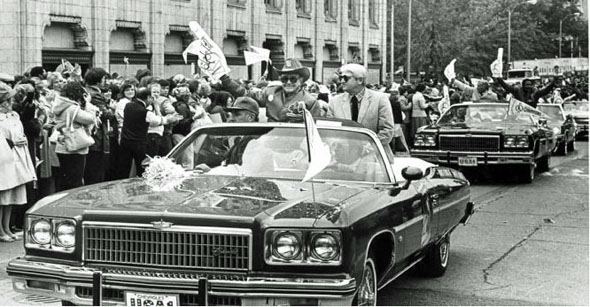
Gussie Busch and Whitey Herzog lead the Cardinals victory parade.
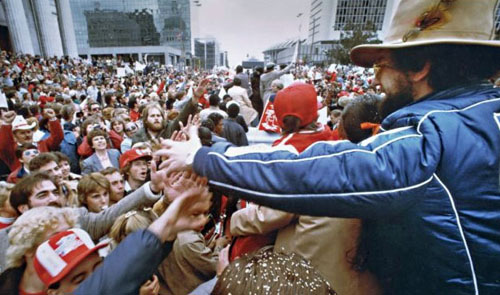
Crowd reaches for Sutter.
Milwaukee held its parade even though their warriors had lost.
- An estimated throng of 150,000 fans poured onto Wisconsin Avenue by noon.
- The parade of antique cars snaked slowly down the avenue, pushing to get through the crowd of office workers, class-cutting students, and just plain folks lined four, five, and six deep along the route.
- A hand-lettered sign summarized the mood of the crowd: We Love You Brewers.
- The crowd cheered Bud Selig at the head of the parade, then roared even louder as the car carrying Harvey and Audrey Kuenn went by. Those on the curb rushed forward to shake hands with the manager.
- Kids ran alongside the cars carrying players, begging for autographs.
- Paul Molitor seemed to elicit the loudest cheer from the throng.
- All in all, you'd have thought you were looking at the victory parade.
- The fans agreed with owner Selig that the Brewers would be back to the Fall Classic soon.
Sixteen years into the next century, with their owner becoming the Commissioner in 1998, the same year the franchise switched to the National League, Milwaukee has still not returned to the World Series. The closest the Brewers have come was a 2011 six-game loss in the NLCS to the Cardinals.
References: The World Series, David S. Neft & Richard M. Cohen (1990)
The Spirit of St. Louis: A History of the St. Louis Cardinals and Browns, Peter Golenbock (2000)
Whitey's Boys: A Celebration of the '82 Cards World Championship, Bob Rains & Alvin Reid (2002)
The Seventh Game, Barry Levenson (2004)
Baseball in Beertown: America's Pastime in Milwaukee, Todd Mishler (2005)
|
|



















